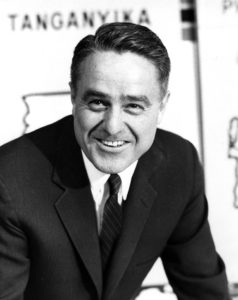Posthumous memoir by Sargent Shriver scheduled for publication in January
Thanks for the ‘heads up’ from Dan Campbell (El Salvador 1974-77)
•
NEW YORK (AP) — The late Sargent Shriver, the Peace Corps’ founding director and an architect of President Lyndon Johnson’s “War on Poverty,” left behind at least one unfinished project.
RosettaBooks announced Tuesday that it had acquired Shriver’s memoir We Called It a War, which he worked on in the late 1960s and was only recently rediscovered. Shriver’s friend and law partner David Birenbaum edited the manuscript, in which Shriver tells of his efforts to fulfill Johnson’s vow in 1964 to end poverty. The 348-page book, pared down from a “very raw” 500 pages, is scheduled for January.
“What I learned from working with Sarge, and what I hope readers will discover in reading the book, is his distinctive model of leadership in which policy is shaped by our noblest human values and energy flows from spiritual awareness,” Birenbaum said in a statement. “He operated under the principle that institutions, including governments, need not be bureaucratic, but can, rather, promote creativity and practical decision-making to benefit the human beings they serve.”
Shriver was the husband of President John F. Kennedy’s sister, Eunice. The Shrivers had personal ties to Rosetta, founded by literary agent Arthur Klebanoff in 2001 as primarily a digital publisher and now distributed in print by Simon & Schuster. Klebanoff is a close friend of Bill Josephson, who was the Peace Corps’ founding general counsel and wrote the book’s foreword.
Shriver, who died in 2011, was a prominent liberal and government official in the 1960s who for many embodied a more idealistic time. He became known for his leadership of the Peace Corps during the Kennedy administration and for helping to establish such lasting government programs as Head Start and VISTA while serving under Johnson. Eunice Shriver, who died in 2009, helped found the Special Olympics.
Shriver was the U.S. ambassador to France at the time he wrote We Called It a War. According to Josephson, he did not try to publish the book right away because he was serving under a new president, Republican Richard Nixon, and thought Nixon might object to Shriver touting government programs which Nixon opposed.
Shriver published a 1964 book, Point of the Lance, about his years with the Peace Corps, and books about him include a memoir by his son, Mark Shriver, and an acclaimed biography by Scott Stossel. We Called It a War was spotted among his personal papers at the Sargent Shriver Peace Institute.
“We had just begun cataloging the contents of a collection of Sarge’s papers from his office at Special Olympics, and we found the manuscript in the first box we opened,” Jamie Price, the institute’s executive director, said in a statement. “What a blessing for us all to have available now, in these difficult and polarizing times, the voice, wisdom, and spirit of a man who knew how to tackle systemic problems of poverty and economic opportunity and to solve them.”

I never read — and never even heard of — Point of the Lance. But I look forward to reading Shriver’s memoir at long last. Shriver seems like a voice from a different time altogether — a time when idealistic people were able to reach for influence.